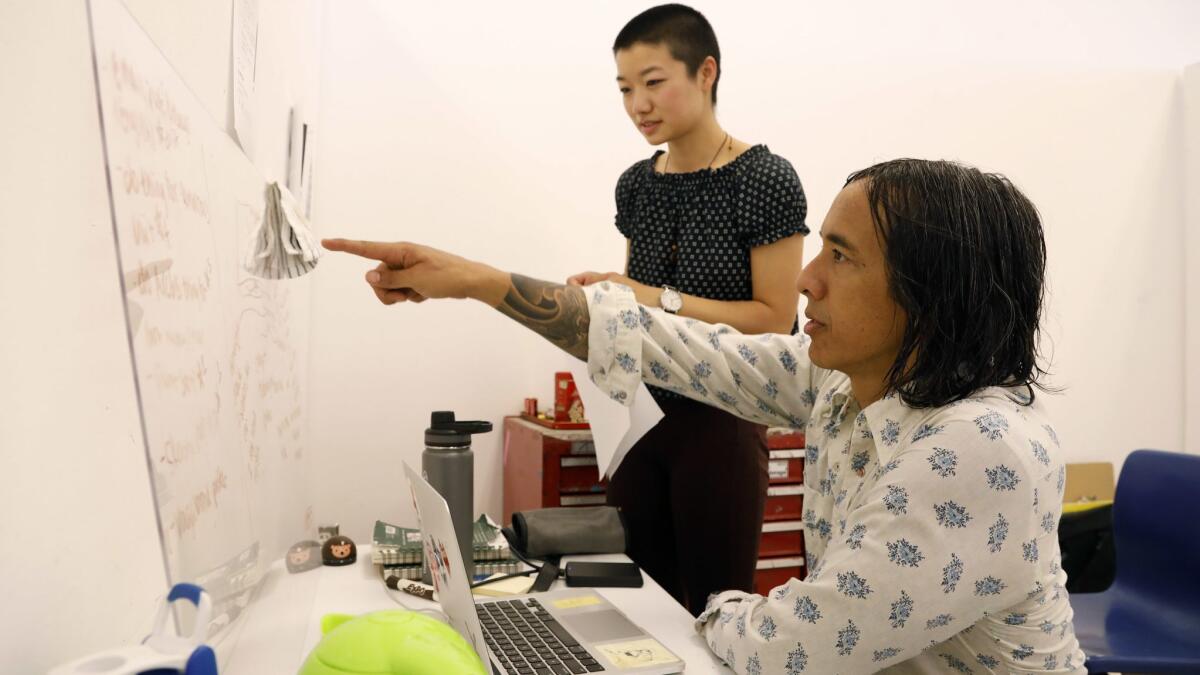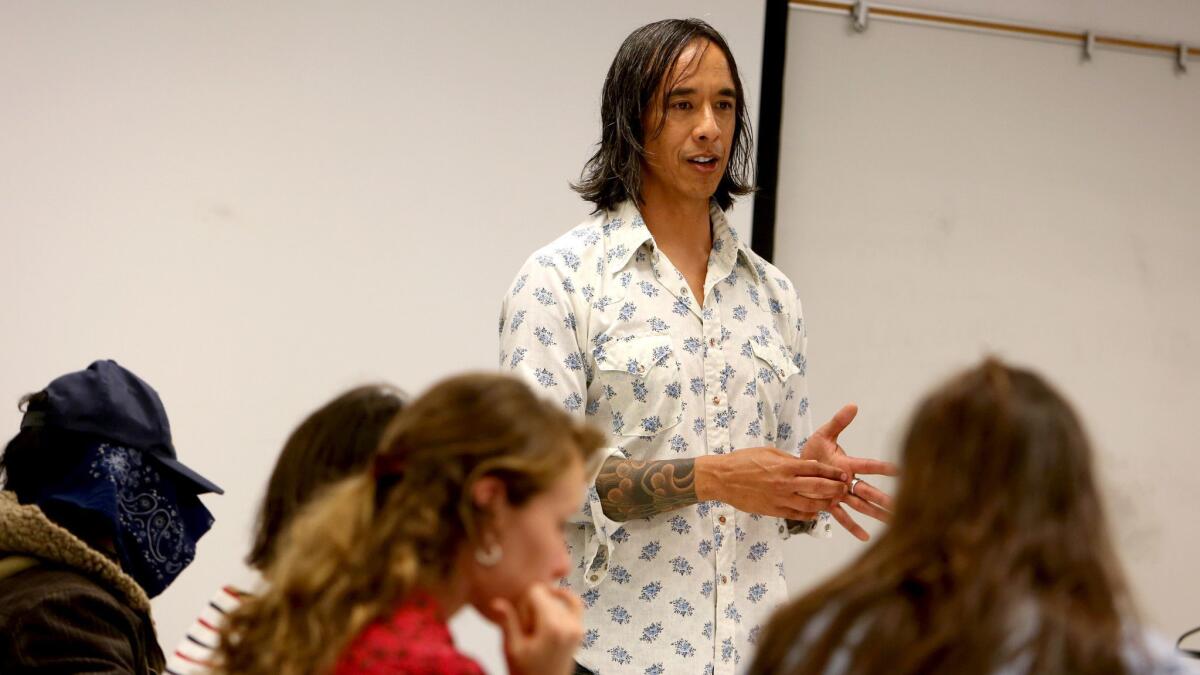As UC Santa Barbara enrolls more students from China, professors complain about cheating and English skills

- Share via
When UC Santa Barbara art professor Kip Fulbeck visited a colleague’s class as a guest lecturer last year, he grew fed up with students who slept, played with their phones or left for the restroom and didn’t come back. He noticed that many of the offenders seemed to be international students from China.
So when he came to that class again this fall to speak about his artistic journey, he opened with a PowerPoint set of rules:
Turn your phones off. Go to the bathroom now. He spelled out his expectations in English — and Chinese.
Some students gasped. Others shrugged it off. Several snapped photos of the list and posted them on Chinese-language social media. Soon, a Chinese student group had raised the specter of discrimination and launched a petition drive, demanding an official explanation.
David Marshall, UC Santa Barbara executive vice chancellor, said he saw both sides and asked all parties to sit down to discuss the incident. The course’s professor apologized in class and in a statement to the student group.
Fulbeck put the blame on the university for failing to fully prepare for what has been a rapid influx of Chinese students. He and other faculty said they have pressed in recent years for international students to be better screened for English-language skills, offered more remedial help and instructed in American university norms, including the importance of academic integrity and respectful classroom behavior.
“Once they are enrolled, it’s our duty to teach them — and we don’t have the tools to do this,” Fulbeck said. “If you’re going to take their money, you have to help them.”
In the last decade, the University of California’s enrollment of international students has more than tripled. Chinese students’ campus presence has grown more than eightfold. Like those from out of state, foreigners pay higher tuition. The money they bring in has helped offset funding cuts prompted by the 2008 recession.
But the growth in the number of non-Californians joining the system sparked a backlash, including a 2016 state audit that accused UC of favoring them over local students.
Under pressure, UC regents last year set limits on the enrollment of non-Californians for the first time.
Santa Barbara enrolled 2,173 students from China last fall — not the most among UC campuses but, at nearly three-quarters of the school’s international students, the largest proportion.
According to admissions director Lisa Przekop, the campus began to recruit overseas in 2011, primarily to expand diversity.
Daniel Wang, a senior from Beijing, said his parents suggested he study in the United States to avoid China’s competitive college entrance exam. After spending a couple of years at UC Santa Cruz, Wang said, he transferred last year because Santa Barbara had higher academic rankings and a more rigorous curriculum.
“I wanted to see the world, and Californians are super kind and super nice,” said Wang, who raved about the beach culture, basketball courts and first-rate Chinese food in the San Gabriel Valley.
Until recently, most of UC’s international students were graduate or postdoctoral researchers. In 2012, undergraduates surpassed them for the first time.
According to faculty members, a troubling number of Chinese undergraduates lack college-level English skills, even though admissions standards generally mandate that foreign students score at “intermediate” levels on the TOEFL English-language proficiency test.
Last year, Fulbeck said, he gave a guest lecture about Japanese tattooing and mixed-race identities known as “hapa” — a term that originated in Hawaii. Problems were evident in the responses to a quiz given right after.
Q: Where does the word “hapa” originate and how is it used now?
A: “Tatto,” wrote one Chinese student.
Marshall, the executive vice chancellor, said administrators were working to address the challenges that having a large foreign-student population presents.
“We were much more cautious and conservative about increasing nonresident enrollment than other campuses, but we’ve now reached a critical mass ... so some of these questions are coming up,” he said. “We do take this seriously. We’re putting more resources into it and we’re learning. There’s more we need to do.”
Chancellor Henry Yang encouraged faculty and other campus personnel to share their concerns without fear of retaliation.

Fulbeck said that his decision to speak out didn’t come easily.
As the son of a Chinese mother and English father, he said, he is acutely sensitive to bias and experienced racist bullying while growing up in a largely white Covina neighborhood. But he worries that failure to address the problems will exacerbate anti-Asian feelings on campuses.
According to Przekop, UC Santa Barbara’s international students graduate at rates equal to Californians.
Still, faculty concern prompted the campus to launch a volunteer pilot program last year using video technology to check Chinese applicants’ English skills. The campus also has expanded its English classes for multilingual speakers — from 13 in 2011 to 64 last year — and held staff seminars on how to help international students succeed.
Teaching tips at an April workshop included writing out key points on slides and posting them online, using English subtitles in videos and pushing students to articulate ideas rather than simply asking whether they understand.
Some faculty members have criticized the suggestions. In a 2016 article, erin Khuê Ninh, an associate professor of Asian American studies, wrote that one tip given — to avoid “challenging” speech including hypothetical questions — was “wildly unrealistic pedagogically” and “robs the domestic students of nuance and complexity in their learning.”
University policies that admit unprepared students ultimately fail them, corrode the quality of education for everyone and create temptations to cheat, she wrote on the popular Angry Asian Man blog.
Cheating is a major concern for some other faculty members too.
A few years ago, UC Santa Barbara faculty were told at a meeting that Chinese students made up 6% of the student body but accounted for one-third of plagiarism cases, according to Paul Spickard, a history professor on the faculty admissions committee.
Spickard said he became suspicious about the paper of one Chinese student, who ultimately was suspended, because it used antiquated British English colloquialisms and only sources that were more than half a century old.
Marshall, the executive vice chancellor, said all suspected cheating should be reported but without “racial profiling.” He added that academic integrity is now highlighted in orientations and class syllabuses.
Art professor Richard Ross retired this year, partly out of frustration about the problems. “My role turned from educator to enforcer, and I didn’t want to do it anymore,” he said.
Wang, the senior from Beijing, said family pressure compels some Chinese students to take academic shortcuts.
“We have a lot of pressure to pay tuition, so some families want the student to graduate earlier, in two or three years,” he said. “I think that’s why they end up cheating — they don’t want a bad grade.”
To uphold integrity and better assess English ability, several faculty members said they favored an approach used by the University of Hawaii at Manoa: testing certain international students once they arrive on campus and placing those with low scores into intensive language courses.
Wang and other Chinese students said most language problems involve freshmen, who know English but may be too shy to use it. At a recent campus event, where Chinese students demonstrated calligraphy and mahjong, many said that they were comfortable with the language when they arrived but that it took time to adjust.

They said UC Santa Barbara has treated them well, but they worry about being negatively stereotyped.
“Chinese international students are seen as a monolith,” said Yichen Li, an honors art major raised in Beijing who has heard classmates say negative things about rich Chinese students with their fancy cars.
Fulbeck doesn’t want to spread those bad impressions, and he said that Li was one of many fine Chinese students at the university. But he feels the only way to ease tensions is to air them and then tackle the problems head-on.
“All I’ve ever tried to do is stand up for students,” he said. “But if we have people being dismissive and disrespectful and hurting everyone else, I want them called out.”
Twitter: @TeresaWatanabe
More to Read
Sign up for Essential California
The most important California stories and recommendations in your inbox every morning.
You may occasionally receive promotional content from the Los Angeles Times.











